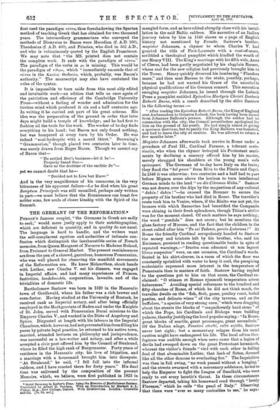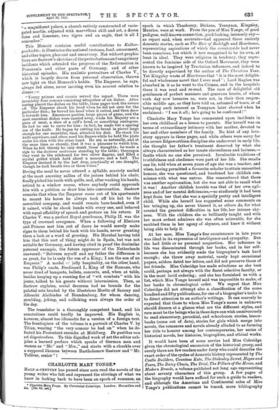THE GERMANY OF THE REFORMATION.* Ponsor's famous couplet, "the Germans
in Greek are sadly to seek," would more justly apply to their autobiographies, which are deficient in quantity, and in quality do not excel. The language is hard to handle, and the writers want the self-complacent egotism and audacities of intimate con- fession which distinguish the- inexhaustible series of French memoirs, from Queen Margaret of Navarre to Madame Roland, from Froissart to General Marbot. The present reminiscences are from the pen of a shrewd, garrulous, humorous Pomeranian, who was well placed for observing the manifold movements of the Reformation era. He knew Melancthon, shook hands with Luther, saw Charles V. eat his dinners, was engaged in Imperial affairs, and had many experiences of Princes, festivities, landsknechts, corporations, lawsuits, and of the trivialities of domestic life.
Bartholomew Sastrow was born in 1520 in the Hanseatic town of Greifswald, where his father was a rich brewer and corn-factor. Having studied at the University of Rostock, he received rank as Imperial notary, and after being officially employed in the Markgraviate of Baden and under the Knights of St. John, served with Pomeranian Ducal missions to the Emperor Charles V., and worked in the Diets 'of Augsburg and Spires. Disgusted at length with his labours in the Imperial Chambers, which, however, bad not prevented him from filling his purse by private legal practice, he returned to his native town, married, attended lectures on philosophy and jurisprudence, was successful as a law-writer and notary, and after a while accepted a civic post offered him by the Council of Stralsund, where he filled the high rank of Burgomaster. Forty years of residence in the Hanseatic city, his love of litigation, and a marriage with a housemaid brought him into disrepute. "At Stralsund," he said, "I fell full into the infernal caldron, and I have roasted there for forty years." His final time was enlivened by the composition of the present Memoirs, which, we believe, were first published in 1823 in
• • •
• Social Germany in Luther's Tim.: being the Memoirs of Bartholomew Sastsow. Translated by Albert D. Vandam. With an-Introduction by Herbert A. L.' Fisher, hI.A.,,New College, Oxford. With Illustration!. London.: Constable and Co, [7s. 6d. net.] mangled form, and es here edited abruptly close with his instal- lation in the said Baltic caldron. His narrative of an Italian
journey taken by him in 1546 shows us a page of English history not mentioned by Froude. Sastrow's brother,
magister Johannes, a rhymer to' whom Charles V. bad granted the title of Post-Laureate with a coat-of-arms, scribbled a theological pamphlet which kindled the wrath of our Henry VIII. The King's marriage with his fifth wife, Anne of Cleves, had been partly negotiated by his cheplain Barnes, whose zeal for the new religion had previously brought him to the Tower. Henry quickly divorced his lumbering "Flanders mare," and then sent Barnes to the stake, possibly, perhaps, because he had not warned his Grace of the unsuitable physical qualifications of his German consort. This execution enraging magister Johannes, he issued through the Lubeck Press a pamphlet entitled Bpicedion Martyris Christi Doctoris Ruberti Barns, with a result described by the elder Sastrow in the following terms :- " After reading the Epicedion Buberti Barns, the King of England sent Ambassadors to threaten Lubeck, the book having been issued from Johannes Balhorn's presses. Although the author had no connection with the city, the Council nevertheless apologised for him on the ground of his youth. He had simply aimed at giving a specimen doctrine, but to pacify the King Balhorn was banished, and had to leave the city at sunrise. He was allowed to return a few months later."
Magister Johannes afterwards took service in Rome under a grandson of Paul III., Cardinal Famese, a tolerant ecele- siastic, who when the rhymer betrayed his Protestant senti- ments by declining a canonry offered him by his master, merely shrugged his shoulders at the young man's nolo episcopari. The Germans of to-day have Italy on the brain; they flood the " bel paese" from Rive to the Pincio and Capri. In 1546 it was otherwise : two centuries and a half had to pass before Mignon arose above the horizon to turn intellectual German minds to the land " wo die Citronen bliihn." Sastrow was not drawn over the Alps by the magnetism of any cultural " dahin ! dahin ! "—he crossed the Brenner to secure the property of his brother who had died in Rome. The traveller's route took him to Venice, where, if the Rialto was not yet, the bronzes with which Sansovino had beautified the Campanile were shining in their fresh splendours, though Titian's atelier was for the moment closed. Of such matters he says nothing,. the word " gondola" does not occur; but he mentions the glass factory of Murano, and the fact that the children in the street called after him " Ta sei Tedesco, percio Luterano !" At Rome the friendly Cardinal scrupulously handed' to Sastrow the money and trinkets left by his brother, who, said his Eminence, persisted in reading questionable books in spite of repeated warnings,—" frustra eum admonui ut non legeret libros suspectos " were, on one occasion, the Cardinal's words. Seated in his shirt-sleeves, in a room of which the floor was constantly sprinkled with water to keep it cool, the perspiring ecclesiastic expressed more interest in the temperature of Pomerania than in matters of faith. Sastrow having replied to the questions put to him on that score, the Cardinal ex- claimed : "O utinam et Romae ejusmodi temperatum Orem haberemus." Avoiding special references to the hundred and fifty churches of Rome, of which he did not think much, the traveller dwells on the "fish, flesh, game, poultry roast, boiled pasties, and delicate wines " of the city taverns, and on the buffaloes, " a species of very strong oxen," which were dragging about the streets the blocks of " magnificently hard stone " of which the Pope, his Cardinals and Bishops were building palaces, thereby justifying the local popular saying : "In Rome, great blocks of marble, great personages, great scoundrels." Of the Italian adage, Pensieri stretti, volto sciolto, Sastrow never lost sight; but a momentary relapse from his usual caution might have endangered his life. The local odium theo- logicum was audible enough when news came that a legion of devils had swooped down on the great Protestant heresiarch, whereat the visitor's friends "vied with each other in falling foul of that abominable Luther, that limb of Satan, doomed like all the other demons to everlasting fire." The InquisitiOn was then in full swing, "no week passed without a hanging;' and the streets swarmed with a mercenary soldatesca, levied to help the Emperor to fight the League of Smalkald, who were ready to cut every heretic's throat. In these circumstances Sastrow departed, taking his homeward road through " lovely Florence," which he calls " the pearl of Italy." Observing that there were "ever so many curiosities to see," he says:
a magnificent palace, a church entirely constructed of varie- gated marble, adjusted with marvellous skill and art, a dozen liens and lionesses, two tigers and an eagle, that is all I remember."
This Memoir contains useful contributions to Sulfur- geschichte: it illustrates the national customs, food, amusement, and other topics, pleasant and unsavoury. Not without graphic force are Sastrow's sketches of the perturbations and sanguinary incidents which attended the progress of the Reformation in Pomerania and other parts of Germany, and of other
historical episodes. His realistic portraiture of Charles V., which is largely drawn from personal observation, throws new light on that Monarch's habits. The Emperor, he says, always fed alone, never inviting even his nearest relation to dinner
"Young princes and counts served the repast. There were invariably four courses consisting altogether of six dishes. After having placed the dishes on the table, these pages took the covers off. The Emperor shook his head when he did not care for the particular dish ; he bowed his head when it suited, and then drew it towards him. Enormous pasties, large pieces of game, and the most succulent dishes were carried away, while his Majesty ate a piece of meat, a slice of a calf's head, or something analogous. He had no one to carve for him : in fact, he made but a sparing use of the knife. He began by cutting his bread in pieces large enough for one mouthful, then attacked his dish. He stuck his knife anywhere, and often used his fingers while he held the plate under his chin with the other hand. He ate so naturally, and at the same time so cleanly, that it was a pleasure to watch him. When he felt thirsty he only drank three draughts; he made a sign to the doctores medicine standing by the table ; thereupon they went to the sideboard for two silver flagons, and filled a crystal goblet which held about a. measure and a half. The Emperor drained it to the last drop, practically at one draught, though he took breath two or three times."
During the meal he never uttered a syllable, scarcely smiled at the most amusing sallies of the jesters behind his chair, finally picked his teeth with quills, and, after washing his hands, retired to a window recess, where anybody could approaCh him with a petition or draw him into conversation. Sastrow remarks that when the Emperor came out of his apartments to mount his horse he always took off his hat to the assembled company, and would remain bare-headed, even if
it rained, while he shook bands with every one, and behaved with equal affability of speech and gesture on his return. If
Charles V. was a perfect Royal gentleman, Philip IL was the type of crowned arrogance. When a following of Electors and Princes met him out of doors he would merely make signs to them behind his back with his hands, never granting them a look or a word of greeting. His Marshal having told him that this sort of thing might do in Spain, but was not suitable for Germany, and having cited in proof the dissimilar paternal example, the future oppressor of the Netherlands answered : " Between myself and my father the difference is as great, for he is only the son of a King ; I am the son of an Emperor." A model of jolly hospitality, on the Other hand, was Philip's uncle, Ferdinand I., King of the Romans, who never tired of banquets, ballets, concerts, and, when at table, besides keeping up a running fire of "wit combats" with his jester, talked to his guests without intermission. Then, as Sastrow explains, social decorum had no bounds for the palatial sets headed by the illustrious Moritz of Saxony and .Albrecht Alcibiades of Brandenburg, for whom dancing,
gambling, joking, and rollicking were always the order of the day.
The translator is a thoroughly competent hand, and his annotations could hardly be improved. His English is, however, almost too idiomatic for a version of a foreign text. The frontispiece of the volume is a portrait of Charles V. by Titian, wearing "the very armour he had on " when he de- feated his Protestant enemies at Miihlherg. De gustibus non
est disputandum. To this dignified work of art the editor sub- joins a learned preface which speaks of German men and
women as " Mr." and " Mrs.," and starts with a chuckle over a supposed likeness between Bartholomew Sastrow and " Mr. Tulliver, senior " I



























































 Previous page
Previous page